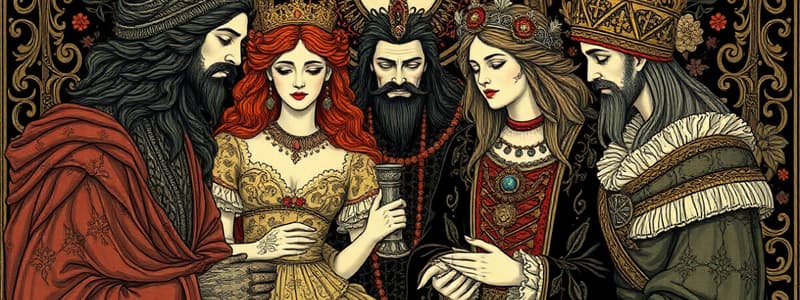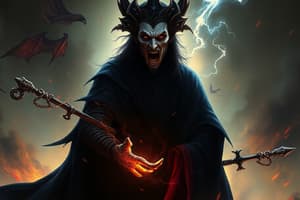Podcast
Questions and Answers
What mood is conveyed with the first scene? Name three details that help set the play's tone.
What mood is conveyed with the first scene? Name three details that help set the play's tone.
The mood is ominous and foreboding. Three details that help set the tone include the stormy weather, the appearance of the witches, and their cryptic conversations.
What do the witches plan to do, and when?
What do the witches plan to do, and when?
The witches plan to meet Macbeth after the battle.
What greater meaning might the line 'Fair is foul, and foul is fair' suggest?
What greater meaning might the line 'Fair is foul, and foul is fair' suggest?
It suggests the theme that appearances can be deceiving and that moral good and evil are not as clear-cut as they seem.
Who is the 'bloody man' questioned? What does he reveal to King Duncan and his entourage about Macdonwald?
Who is the 'bloody man' questioned? What does he reveal to King Duncan and his entourage about Macdonwald?
What has the Thane of Cawdor done, and what will happen to him?
What has the Thane of Cawdor done, and what will happen to him?
What does Duncan mean when he says of the Thane of Cawdor, 'What he hath lost, noble Macbeth hath won'?
What does Duncan mean when he says of the Thane of Cawdor, 'What he hath lost, noble Macbeth hath won'?
What view of Macbeth is presented in this scene? What characteristics are ascribed to him?
What view of Macbeth is presented in this scene? What characteristics are ascribed to him?
How does this scene serve as explanation?
How does this scene serve as explanation?
What have the witches been doing since they last appeared?
What have the witches been doing since they last appeared?
What in the witches' conversation suggests they are not all-powerful?
What in the witches' conversation suggests they are not all-powerful?
What sort of day is it, according to Macbeth, and what does he mean? Which of the play's themes does his remark emphasize?
What sort of day is it, according to Macbeth, and what does he mean? Which of the play's themes does his remark emphasize?
Describe what the witches look like, according to Banquo.
Describe what the witches look like, according to Banquo.
What do the witches tell Macbeth will happen to him?
What do the witches tell Macbeth will happen to him?
Flashcards are hidden until you start studying
Study Notes
Characters
- Macbeth: A Scottish general, he is ambitious and driven, however he doubts himself and questions his actions.
- Lady Macbeth: Macbeth’s wife, she is strong, manipulative, and ambitious. She is driven to become queen, and she spurs Macbeth into action.
- The Witches: Three supernatural figures who make predictions about Macbeth’s future. They are mysterious and ambiguous.
- Banquo: A Scottish general, he is Macbeth's best friend and a strong supporter of Duncan.
- Duncan: The King of Scotland, he is a virtuous, just and benevolent ruler.
- Malcolm: Duncan's eldest son, he is rightful heir to the throne, and flees Scotland after his father's murder.
- Donalbain: Duncan's younger son, he also flees Scotland after his father’s assassination.
- Fleance: Banquo's son, who escapes assassination attempted by Macbeth.
- Macduff: A Scottish nobleman who is loyal to Duncan and opposes Macbeth's tyranny, he exposes Macbeth's treachery and plans to murder him.
- Ross: A Scottish nobleman who serves as a messenger and observer of events.
- Lennox: A Scottish nobleman who initially supports Macbeth but soon becomes aware of his crimes and joins Macduff in opposing him.
Summary of the Plot
- The play opens with three witches meeting to plot a course of action including a meeting with Macbeth.
- Macbeth victorious in a battle, is praised for his bravery and awarded the title of Thane of Cawdor.
- The witches prophesize Macbeth will be Thane of Cawdor and King of Scotland.
- Macbeth is shocked and excited by the witches’ predictions, but also unsure if he should pursue the prophecy.
- Lady Macbeth, ambitious and power-hungry, urges Macbeth to take action to secure the throne.
- Macbeth murders Duncan while the king is visiting Macbeth’s castle.
- Duncan’s sons flee Scotland and Macduff becomes suspicious, fearing for his life he flees to England.
- Macbeth is crowned king, but he is tormented by guilt, and he fears for his reign.
Themes
- Ambition: Macbeth's ambition is the driving force of the play, and it ultimately leads to his downfall.
- Judging by Appearances: The play explores how appearances can be deceiving and can mask one's true intentions.
- Guilt: The characters in the play are tormented by guilt, which leads to their downfall.
- Manhood/Masculinity: The play explores the roles of men and women in society and the expectations of masculinity.
Motifs
- Blood: used to symbolise guilt, violence and consequences.
- Water: used to represent cleansing, renewal and the desire to expiate sin.
- Sleep: a source of peace but also a symbol of guilt and an inability to rest.
Symbols
- Dagger & Banquo's Ghost: represent Macbeth’s guilt and descent into madness.
Literary Devices
- Dramatic Irony: The audience knows things that the characters do not, creating suspense and tension.
- Soliloquies: Macbeth and Lady Macbeth use these to reveal their inner thoughts and motivations.
- Asides: deliver brief comments from characters directly to the audience, often revealing secrets.
- Dramatic Monologues: long speeches by characters filled with emotion and reflecting on their thoughts.
- Allusions: a reference to a literary, historical, or cultural figure or event.
- Tragic Hero: The protagonist who is flawed but noble.
Studying That Suits You
Use AI to generate personalized quizzes and flashcards to suit your learning preferences.




